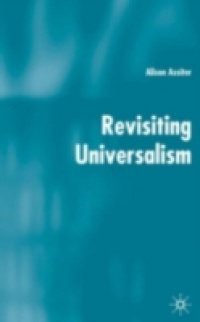Most recent 'universalist' theories - those that suggest that the features shared by all of us are significant - are liberal. Such theories start from the assumption that, in our contemporary world, it is axiomatic that we accept a plurality of ethical and political perspectives.This book seeks to defend a non-liberal form of universalism. It is one that derives, not from our shared rights, but from our common natural nature. it suggests that there is something important and significant that the very rich share with the desperately poor - a set of natural needs. These needs are not insignificant, but rather, in a world where the riches of a few billionaires exceed the combined incomes of 45% of the world's population, they are very important indeed. Pluralist moral perspectives may not be axiomatic at all, given these facts.Assiter argues that moral consequences and moral obligations towards one another flow from the fact of our shared natures. Furthermore, drawing on this thesis, the book sets out to develop a non-relativist epistemology.

